Overview
In the demanding world of healthcare, providers often face emotional challenges that can weigh heavily on their well-being. The pressures of administrative tasks can detract from the core mission of patient care, leading to feelings of burnout and frustration. Have you ever felt overwhelmed by the sheer volume of paperwork and processes? You're not alone.
To help alleviate these burdens, essential medical software tools can make a significant difference. Consider the following solutions:
- AI platforms that streamline decision-making processes.
- EHR systems that simplify patient data management.
- Telemedicine applications that enhance patient access to care.
- Revenue cycle management software that optimizes billing and collections.
These tools not only improve efficiency but also enhance the quality of care you provide. By reducing administrative burdens, they allow you to focus more on what truly matters—your patients. Imagine the relief of having more time to connect with those you care for, ultimately supporting your own well-being as a healthcare professional.
We encourage you to explore these solutions further. Embracing technology can transform your practice, making it more manageable and fulfilling. Together, we can address the challenges of healthcare and create a more supportive environment for everyone involved.
Introduction
In the fast-paced world of healthcare, providers often face overwhelming challenges. Rising costs and physician burnout can weigh heavily on their shoulders, leaving little room for what truly matters—their patients. How can healthcare professionals navigate these emotional hurdles while striving to deliver the best care possible?
The integration of advanced medical software tools offers a beacon of hope. These tools not only streamline administrative tasks but also allow healthcare providers to focus more on patient care. Imagine a world where the burden of paperwork is lifted, enabling professionals to spend more time with those who need them most.
As we explore the essential medical software tools available today, we uncover solutions that promise to transform healthcare delivery. Here are some key benefits these tools can provide:
- Enhanced operational efficiency: Automating routine tasks frees up valuable time.
- Improved patient outcomes: More time with patients leads to better care.
- Reduced stress: Alleviating administrative burdens helps combat burnout.
By embracing these innovative technologies, healthcare providers can not only improve outcomes but also create a more fulfilling work environment. Let’s take this journey together, exploring how we can leverage these advancements to foster a healthier future for both providers and patients.
CosmaNeura: AI Platform for Administrative Efficiency in Healthcare
CosmaNeura stands at the forefront of Agentic AI technology, thoughtfully crafted for primary health practitioners who embrace Christian values. Imagine the relief of medical professionals as essential administrative tasks—like client intake and triage—are automated with the help of medical software tools. This innovative approach not only lightens their administrative load but also allows them to devote more time to compassionate treatment, aligning beautifully with the ethical principles of Catholic teachings.
The impact of AI on administrative efficiency is profound. Research shows that healthcare organizations adopting AI solutions experience a 13-21% increase in staff productivity, paving the way for reinvestment in client services. Moreover, 57% of physicians recognize that alleviating administrative burdens through automation presents a significant opportunity for AI.
CosmaNeura's AI solutions incorporate medical software tools that are designed to streamline workflows, enhance data management, and improve patient interactions. Currently, pilot testing is underway with three physicians, offering valuable insights into the effectiveness of these solutions in real-world settings.
Successful implementations of AI in primary health environments, such as those at The Permanente Medical Group, reveal that ambient AI scribes can save physicians an average of one hour per day, significantly easing documentation stress. This resonates with medical leaders who see AI's potential to boost work efficiency and enhance job satisfaction. As the medical landscape evolves, platforms like CosmaNeura are not just transforming workflows; they are reshaping the quality of service provided to individuals with the help of medical software tools. This makes health services more human and accessible while addressing the pressing issues of rising costs and physician burnout.
Key Solutions Offered by CosmaNeura:
- Automated administrative tasks to reduce workload.
- Enhanced patient interactions through streamlined workflows.
- Increased productivity allowing more focus on compassionate care.
As we navigate these challenges together, consider how embracing AI can not only lighten your load but also enrich the care you provide. Are you ready to explore how CosmaNeura can support you in this journey?
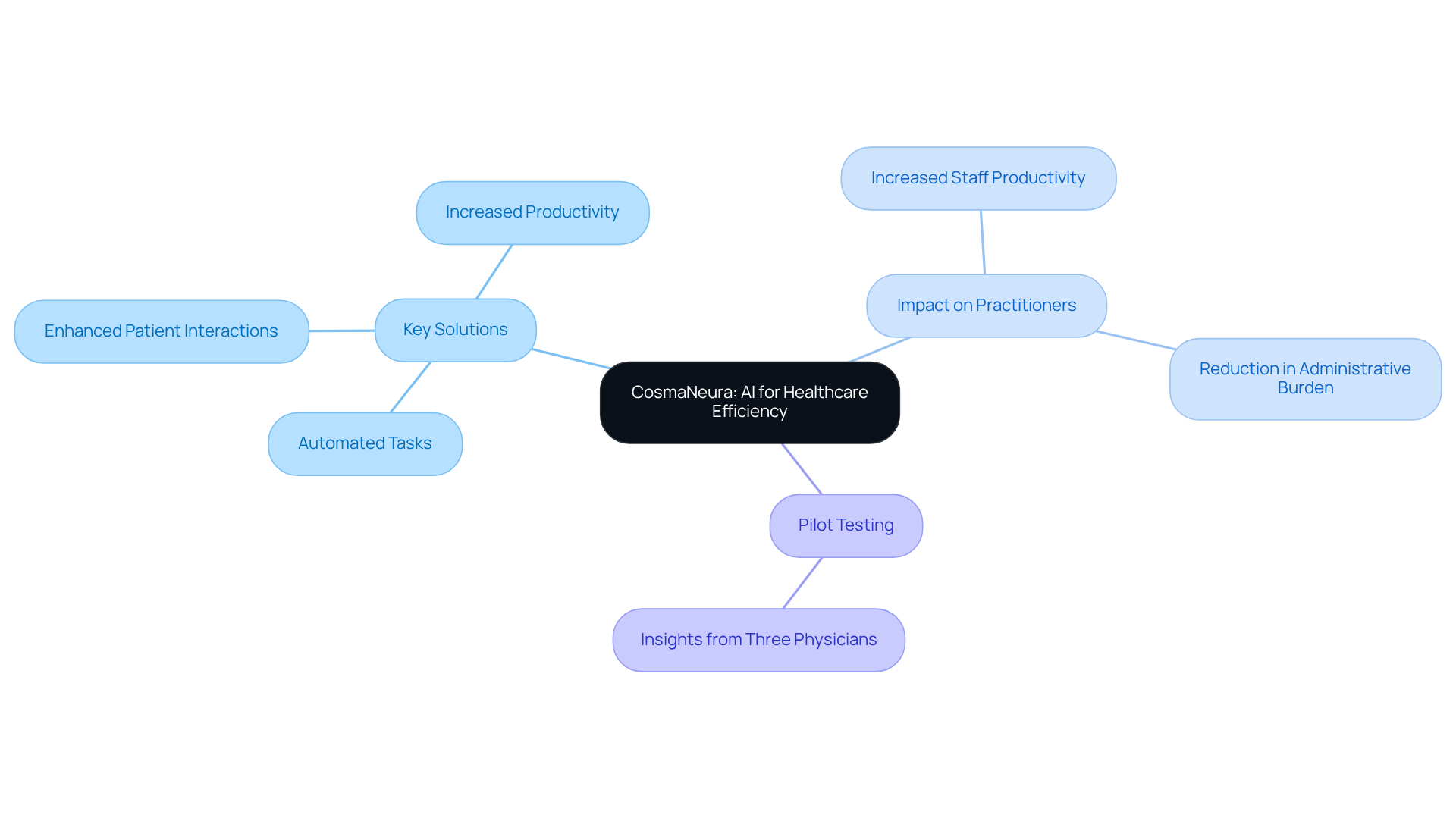
Electronic Health Record (EHR) Software: Streamline Patient Data Management
Medical software tools, such as Electronic Health Record (EHR) software, offer a compassionate solution for healthcare providers grappling with the overwhelming demands of managing client data. Imagine the relief of having all pertinent information at your fingertips in real-time, allowing you to focus more on what truly matters—your patients. This streamlined data management not only enhances the quality of care but also significantly reduces the risk of errors. In fact, research shows that EHR systems lead to a 40% decrease in diagnostic mistakes compared to traditional paper records. Isn’t that a reassuring statistic when it comes to patient safety?
Consider the features of medical software tools, such as automated reminders and integrated billing. These medical software tools not only assist in complying with regulatory standards but also promote greater engagement with your patients. It’s heartening to know that over 90% of medical organizations are utilizing EHR data for population health management and research. This highlights the vital role of medical software tools in enhancing individual outcomes and ensuring that every patient receives the care they deserve.
As we look ahead to 2025, it’s crucial to adopt best practices for EHR implementation. By doing so, you can maximize the benefits of this technology and maintain a patient-centric approach to care. Let’s embrace these advancements together, ensuring that we continue to provide the highest quality of care for those who rely on us.
Key Solutions to Consider:
- Streamlined data management for real-time access
- Automated reminders to enhance compliance
- Integrated billing for improved user engagement
Together, we can navigate the evolving landscape of healthcare, ensuring that our focus remains on the well-being of our patients.
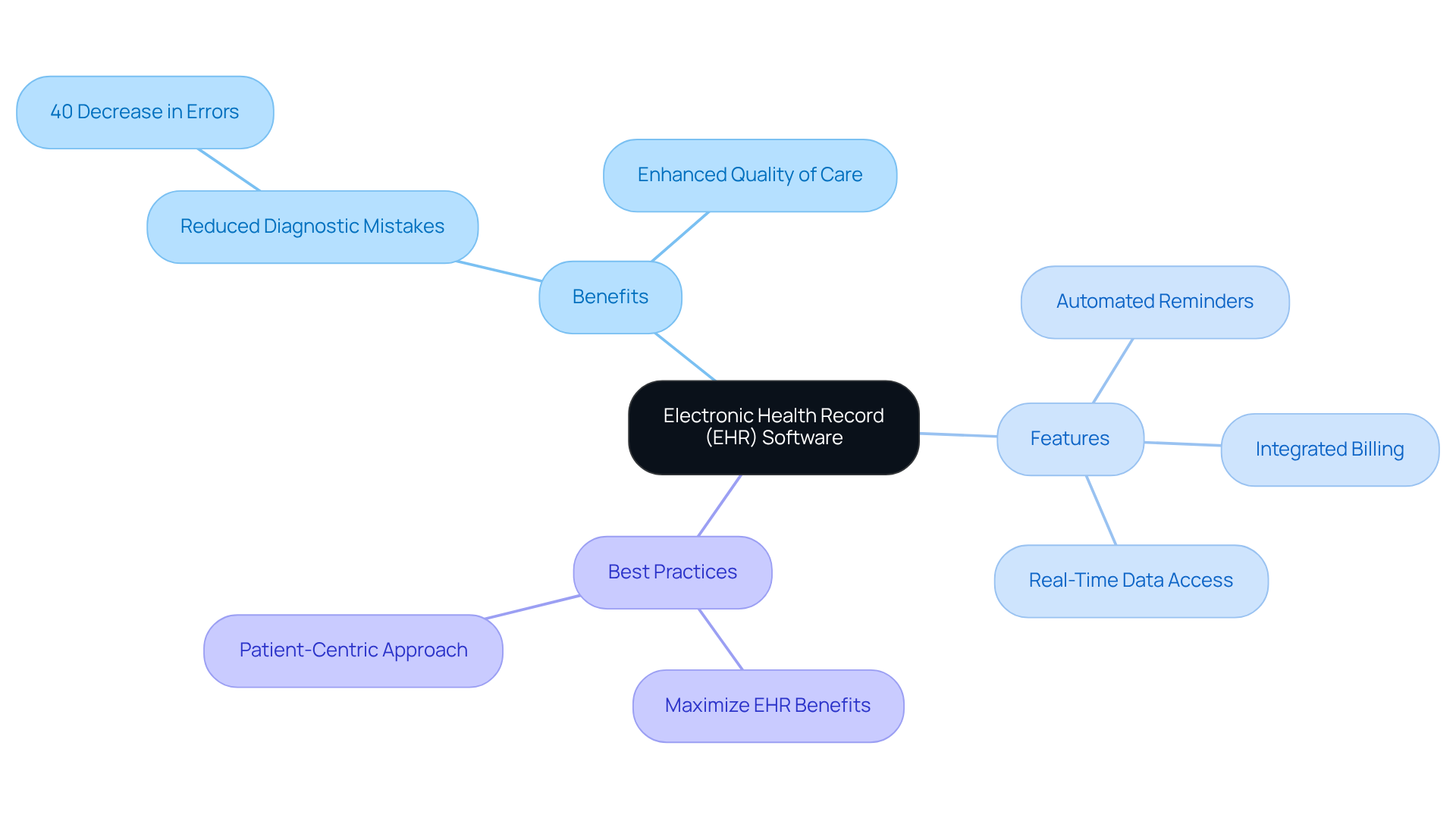
Telemedicine Software: Facilitate Remote Patient Consultations
Telemedicine applications are truly changing the way we deliver medical services, making it easier for individuals to connect with healthcare professionals, no matter where they are. Have you ever felt frustrated by the limitations of in-person visits? With secure video conferencing, efficient appointment scheduling, and integrated health records, telemedicine breaks down those geographical barriers, enhancing access for everyone.
This technology not only boosts patient satisfaction—94% of individuals are ready to participate in virtual visits again—but it also lightens the load on in-office appointments. This means healthcare providers can focus more on what truly matters: patient care. Imagine a world where your healthcare experience is seamless and stress-free.
As telemedicine continues to evolve, it now represents 25-30% of medical visits in certain areas. Its growing influence on accessibility and satisfaction is undeniable, establishing medical software tools as a vital resource for modern medical practices. Let’s embrace this change together and explore how telemedicine can enhance your healthcare experience.

Clinical Decision Support Systems: Enhance Diagnostic Accuracy
Clinical Decision Support Systems (CDSS) play a crucial role in supporting healthcare professionals as they navigate the complexities of diagnosis. Have you ever felt overwhelmed by the sheer volume of clinical data and medical literature? CDSS can help lighten that load by suggesting potential diagnoses and treatment options, which significantly reduces the risk of diagnostic errors.
Research shows that implementing CDSS has led to an impressive 11.3% increase in diagnoses and a remarkable 37% reduction in false negatives among Nurse Practitioners across 1,874 clinical sites. This technology empowers healthcare providers to make informed decisions, ultimately enhancing patient outcomes. Imagine the peace of mind that comes with knowing that the accuracy of AI-based CDSS recommendations reached 75.46% for first-rank diagnoses, 83.94% for top-2 diagnoses, and 87.53% for top-3 diagnoses. It’s a testament to its effectiveness in real-world settings.
As Taku Harada wisely states, "Preventing diagnostic errors in primary settings requires urgent action, and one of the possible methods is the use of health information technology." By integrating medical software tools like CDSS into clinical workflows, medical professionals can sharpen their diagnostic skills, leading to safer and more effective treatments for their patients.
Notably, after CDSS implementation, the consistency of admission and discharge diagnoses improved significantly, rising from 70.37% to 72.64%. This improvement underscores the vital role of CDSS in addressing the estimated 12 million diagnostic errors that occur each year in primary care. It also helps overcome the challenges faced in medical delivery through innovative medical software tools and AI solutions like CosmaNeura's Agentic Platform.
Incorporating CDSS is not just about technology; it’s about enhancing the quality of care we provide. Let’s embrace these tools to support our commitment to patient safety and effective treatment.
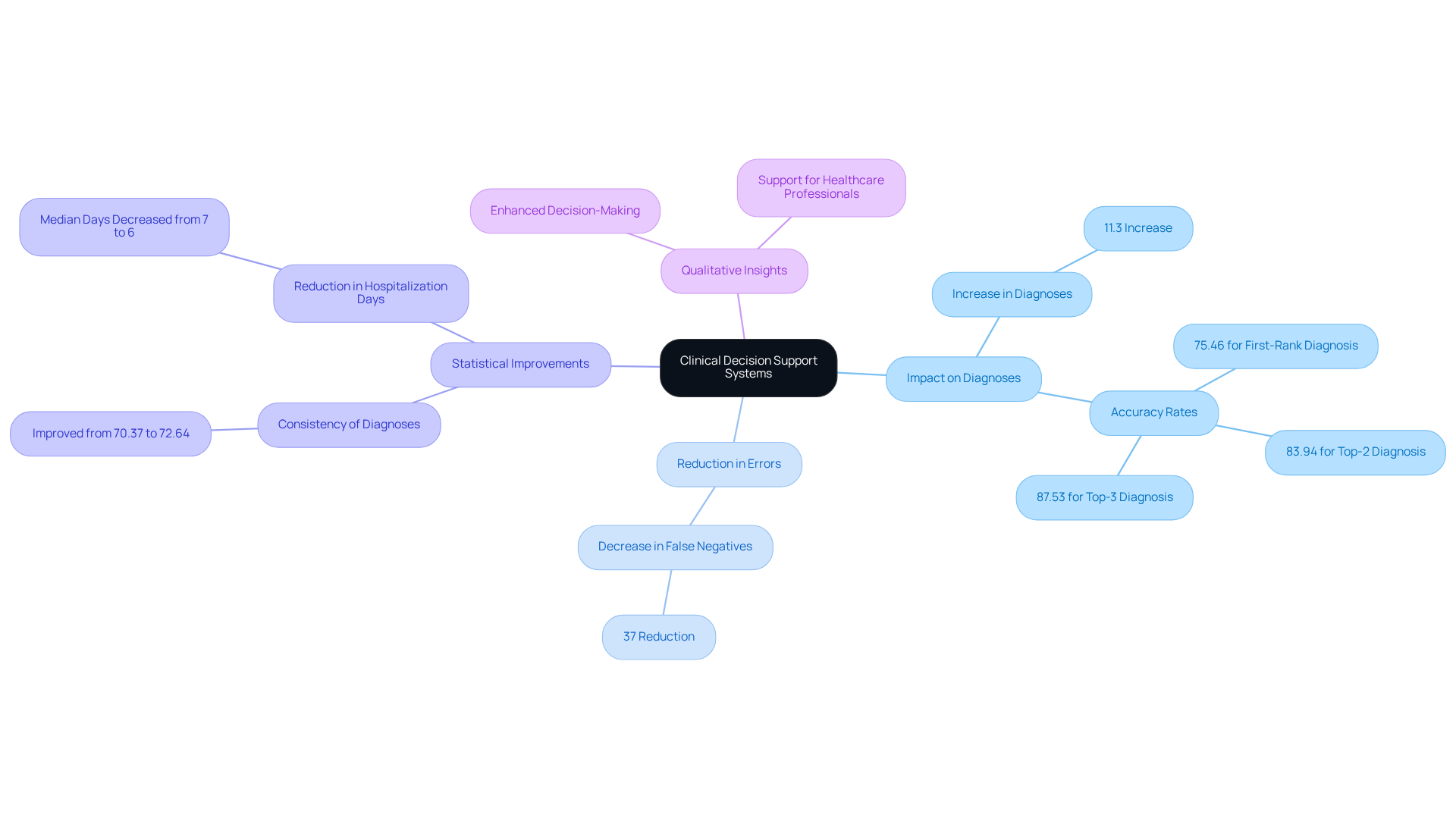
Medical Practice Management Software: Optimize Operations and Billing
Medical software tools serve as a vital ally for healthcare professionals, addressing the emotional and operational challenges they face daily. With the weight of scheduling, billing, and client communications often resting heavily on their shoulders, it’s no wonder that many experience stress and burnout. By automating these essential tasks, practices can significantly reduce errors and enhance efficiency, allowing providers to focus more on what truly matters: patient care.
Imagine being able to optimize appointment scheduling effortlessly. With features that allow patients to book, reschedule, or cancel appointments online, delays are minimized, and the administrative load on physicians lightens. This not only eases stress but also fosters a more positive experience for both providers and patients.
Moreover, real-time reporting and analytics empower healthcare providers to monitor their performance metrics effectively. This capability supports data-driven decision-making, leading to continuous improvement in practice operations and ultimately enhancing the quality of care delivered to patients. Did you know that in 2024, the global practice management system market was valued at USD 11.74 billion? Projections indicate it will grow to USD 23.70 billion by 2032, reflecting a CAGR of 9.3%. This growth underscores the increasing reliance on medical software tools to enhance medical service delivery and support physician well-being.
Billing automation is another crucial benefit of practice management software. By managing insurance verification and copayment amounts automatically before appointments, these systems enhance billing accuracy and clarity. For example, Veradigm LLC recently introduced a conversational AI agent for Practice Fusion Billing Services, aiming to simplify billing processes for independent medical practitioners. This innovation highlights how technology can enhance revenue cycles and boost operational efficiency.
Healthcare leaders are increasingly recognizing the transformative impact of medical software tools on operational efficiency and physician burnout. As the demand for effective management solutions rises, the integration of advanced technologies continues to shape the future of healthcare administration. This ensures that providers can concentrate more on delivering care while optimizing their workflows.
However, it’s essential to acknowledge the challenges that remain, such as data security and privacy concerns. Robust compliance with regulations like HIPAA and HITECH is necessary to protect individual information.
In conclusion, embracing medical software tools not only alleviates administrative burdens but also supports the well-being of healthcare providers. Let’s take steps together to create a more supportive environment in healthcare, where professionals can thrive while delivering exceptional care.
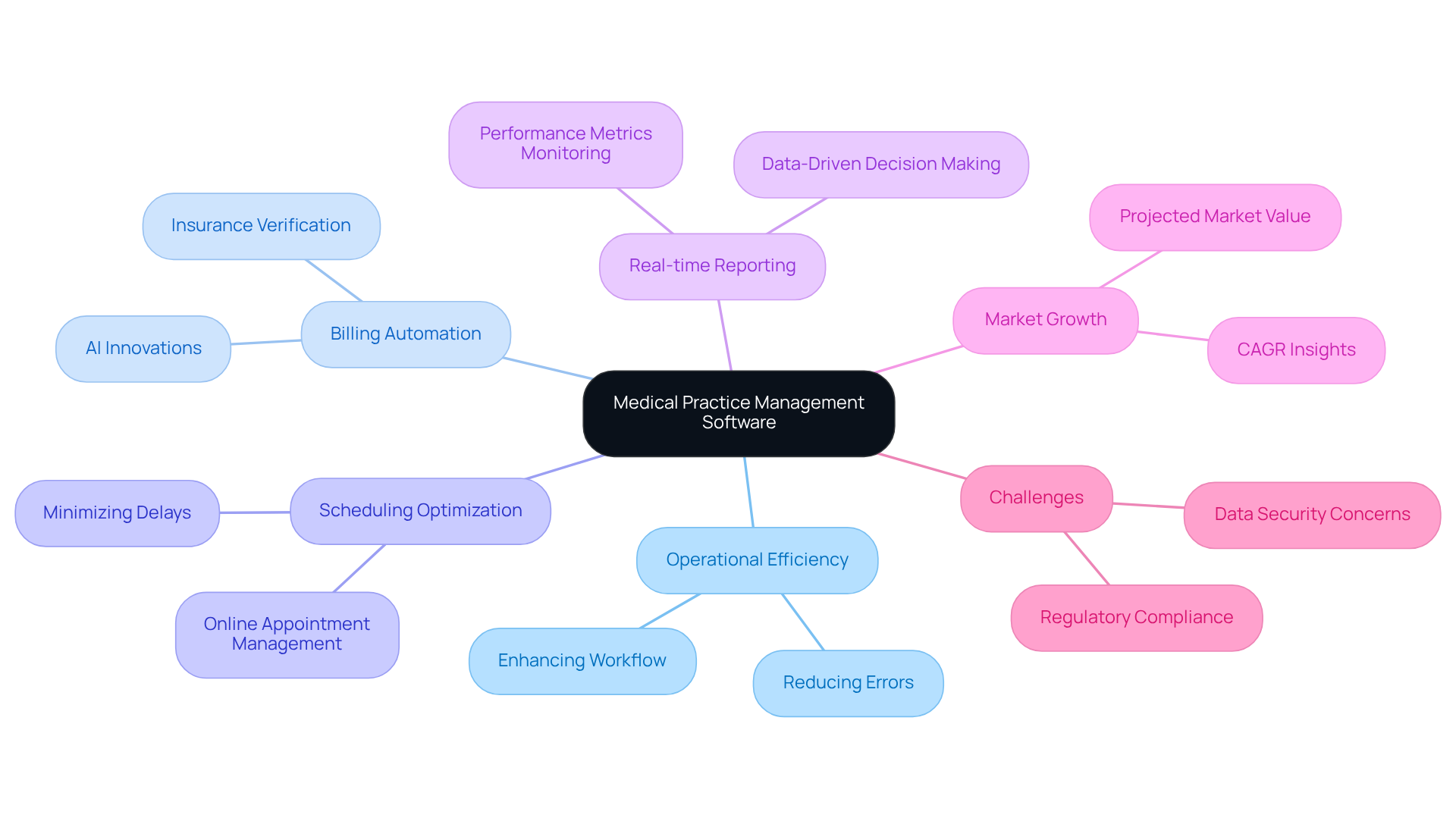
Patient Portal Software: Empower Patients with Access to Health Information
Medical software tools like health portal software offer individuals secure access to essential health information, such as lab results, appointment scheduling, and medication management. This technology empowers individuals to take an active role in their medical care, fostering better communication between them and their healthcare providers. Have you ever felt overwhelmed by managing your health? You're not alone. Research indicates that individuals who utilize these portals are more likely to adhere to treatment plans, leading to improved health outcomes.
For instance, medical organizations that have implemented user-friendly portals report a notable increase in client satisfaction and a reduction in administrative burdens. As Dr. Christopher Apostol notes, "The client portal is one that we strongly support because we believe that it offers tremendous value for those we serve to have access to information, their records, their lab results." This sentiment reflects a growing recognition of the importance of accessible health information.
Moreover, the portal market is projected to grow from $5.37 billion in 2024 to $6.41 billion in 2025, highlighting the increasing demand for medical software tools that are vital in modern healthcare. By facilitating direct communication and providing individuals with the resources they need, portals are reshaping the healthcare experience. This transformation not only enhances health outcomes but also strengthens the relationships between providers and individuals.
Key Benefits of Health Portals:
- Improved communication with healthcare providers.
- Increased adherence to treatment plans.
- Enhanced client satisfaction.
- Reduced administrative workload for providers.
As we move forward, consider how these medical software tools can aid your health journey. Engaging with your healthcare provider through these portals can lead to a more informed and empowered experience. Let's embrace this change together, ensuring that everyone has the opportunity to thrive in their health journey.

Remote Patient Monitoring (RPM) Software: Track Health Metrics Effectively
Remote Health Monitoring (RPM) medical software tools are revolutionary for healthcare professionals, enabling them to track individuals' health metrics in real-time. This capability not only enables timely interventions but also provides personalized support that can make a world of difference. Have you ever wondered how much easier it would be to monitor vital signs and health indicators continuously? With wearable devices and mobile applications, healthcare providers can ensure individuals receive essential support between visits.
This proactive approach significantly enhances health outcomes, especially for those managing chronic conditions. In fact, studies show that RPM can reduce hospital readmissions by up to 76%. Imagine the relief for both patients and providers when chronic disease management becomes more effective. Healthcare experts have noted that RPM fosters better involvement from individuals and allows for more precise monitoring of health metrics, leading to improved compliance with treatment plans.
As one cardiologist wisely stated, "The capacity to observe individuals from a distance has changed how we handle chronic illnesses, enabling us to act before problems intensify." With the anticipated rise in RPM adoption, expected to reach 70.6 million users by 2025, integrating medical software tools into medical practices is becoming increasingly essential for enhancing care.
Incorporating RPM into your practice could be a vital step toward improving patient outcomes. Are you ready to embrace this change and provide the best possible support for your patients?
![]()
E-Prescribing Software: Simplify Prescription Management
Medical software tools, including e-prescribing software, are transforming how medical professionals manage prescriptions by enabling them to send them electronically straight to pharmacies. This innovation is crucial in reducing the risks tied to handwritten prescriptions, which can often lead to errors. Did you know that medication errors impact at least 1.5 million individuals every year? This statistic highlights the urgent need for more reliable systems in healthcare.
By providing immediate access to detailed medication records and allergy information, e-prescribing not only enhances safety for patients but also empowers healthcare professionals to make informed decisions. Imagine the peace of mind that comes from knowing that your prescriptions are handled with care and precision.
Moreover, medical software tools such as e-prescribing streamline workflows, allowing medical practitioners to spend more time focusing on patient care rather than getting bogged down by administrative tasks. This efficiency boosts job satisfaction among providers and leads to better health outcomes for patients. Real-world examples show that hospitals using e-prescribing solutions have seen a significant drop in medication errors, creating safer environments for everyone involved.
As the e-prescribing market continues to grow, its integration with medical software tools, such as electronic health records (EHR), further enhances clinical decision-making. This ensures that patient safety remains a top priority in medical delivery. Let's work together to embrace these advancements and foster a healthcare system that prioritizes the well-being of both providers and patients.
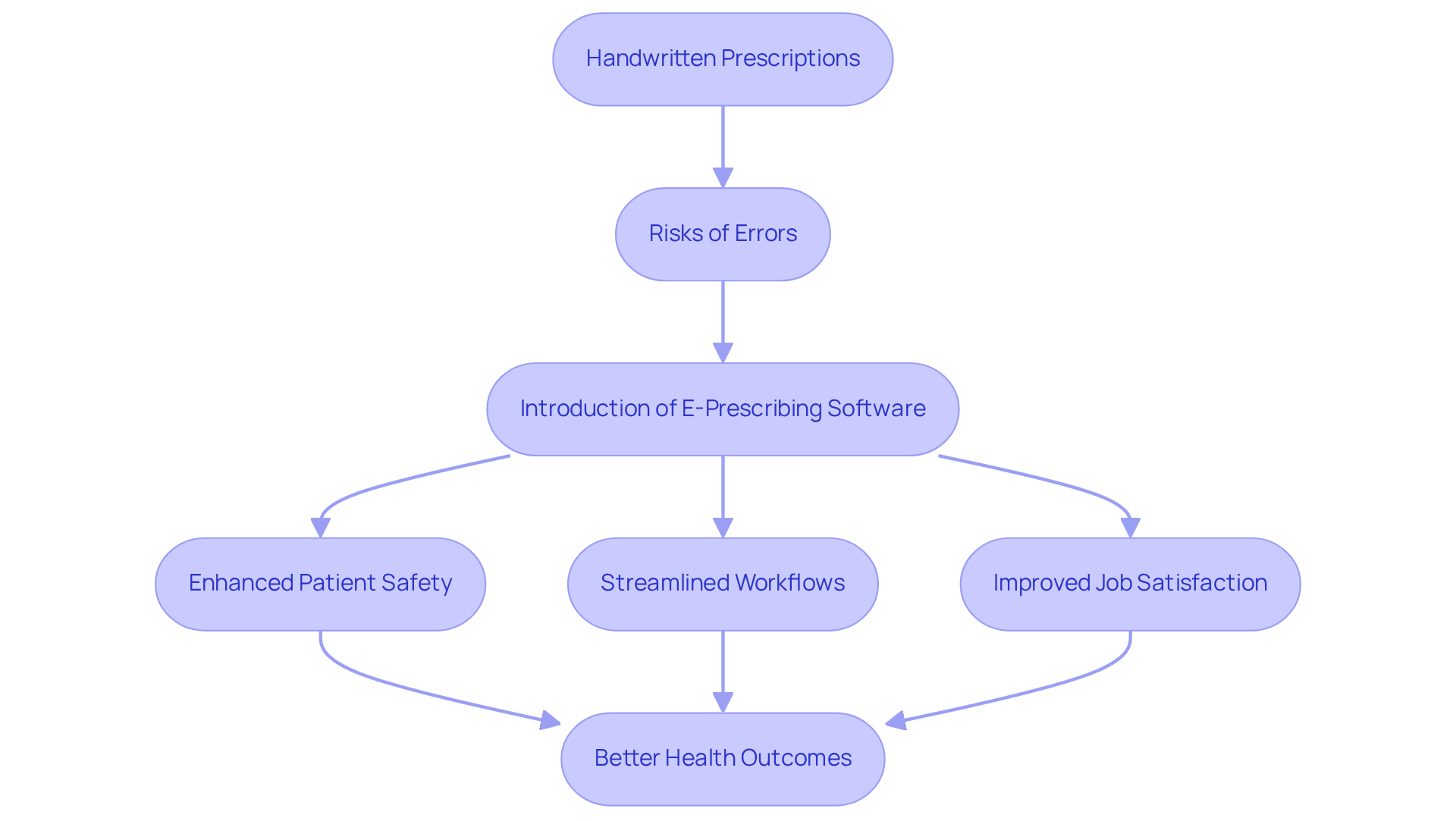
Medical Imaging Software: Analyze Diagnostic Images Efficiently
In the demanding world of healthcare, professionals often face emotional challenges that can impact patient care. Medical software tools, including medical imaging software, offer a lifeline, enabling healthcare providers to examine diagnostic images—like X-rays, MRIs, and CT scans—with remarkable accuracy. Imagine the relief of knowing that advanced AI algorithms can analyze vast amounts of medical data, including individual history, symptoms, and test results, significantly enhancing diagnostic accuracy.
Research shows that radiologists using AI assistance in breast cancer screening are more effective than those working alone. This highlights the importance of integrating AI into diagnostic processes. Moreover, when imaging software connects seamlessly with Electronic Health Record (EHR) systems, all relevant patient information is readily accessible. This connectivity empowers providers to make better-informed clinical decisions, ultimately leading to improved patient outcomes through timely and accurate diagnoses.
As the medical imaging software market is projected to grow from USD 4.26 billion by 2025 to USD 12.76 billion by 2030, the demand for medical software tools is on the rise. This growth underscores the vital role that medical software tools play in modern medical services. However, it’s crucial to address challenges like data security concerns to ensure the safe and effective use of these technologies.
By utilizing innovative AI solutions, CosmaNeura's Agentic Platform is tackling these challenges head-on. Here are some key benefits:
- Improved care delivery
- Reduced administrative burdens
- Enhanced patient outcomes
In a field where every moment counts, embracing these advancements can make a significant difference. Let’s work together to ensure that healthcare providers have the tools they need to deliver compassionate and effective care.
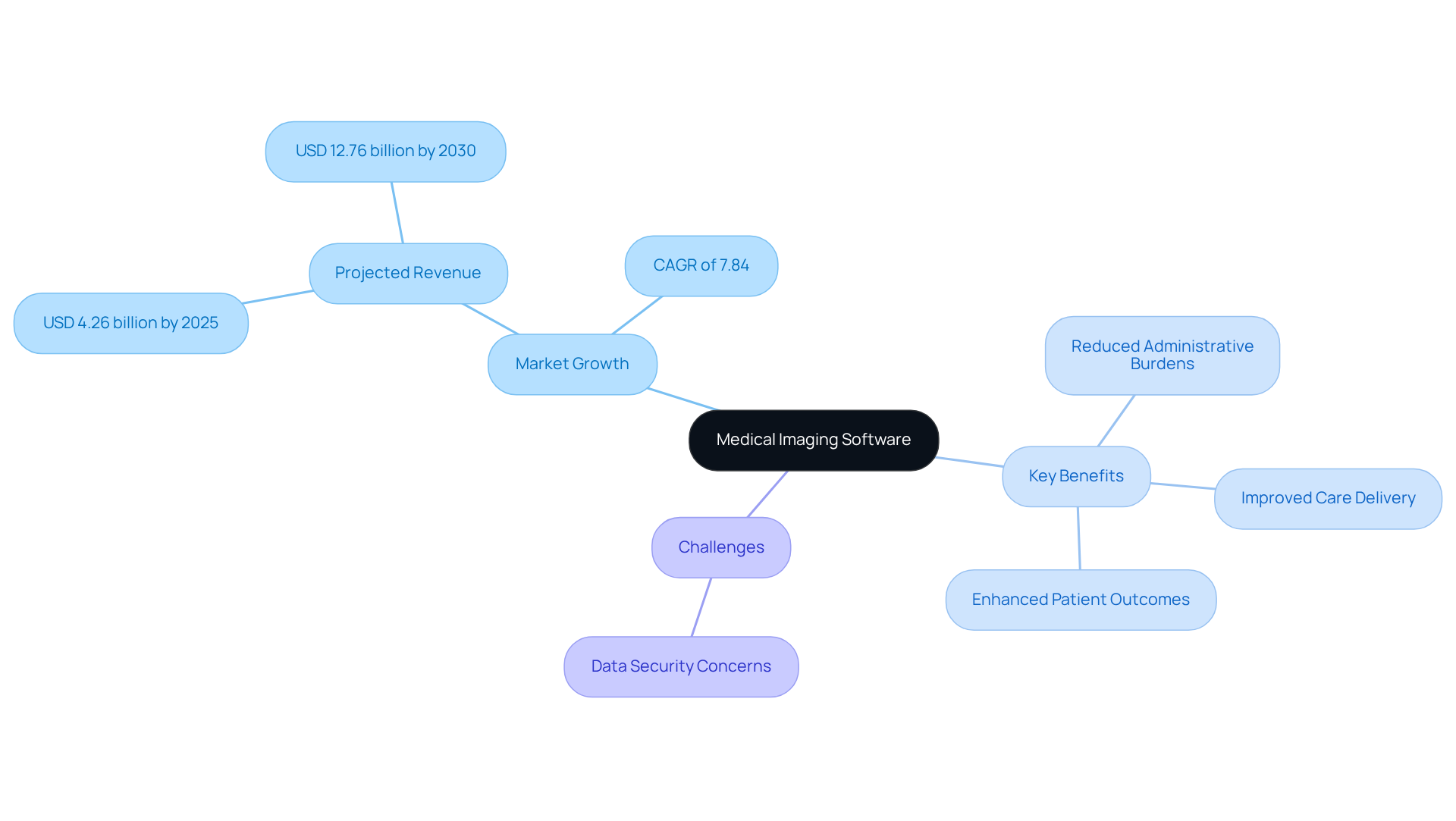
Revenue Cycle Management Software: Optimize Financial Performance
Healthcare providers striving to optimize their billing and collections processes find that medical software tools for revenue cycle management (RCM) are essential. It ensures that medical professionals receive timely payments for their invaluable services. By automating crucial tasks like claims processing and payment tracking, practices can significantly lower administrative costs and improve cash flow. Did you know that the U.S. revenue cycle management market was valued at around $64.13 billion in 2022? It's projected to grow at a compound annual growth rate (CAGR) of 10.7% from 2023 to 2030, highlighting the increasing reliance on RCM solutions.
Moreover, medical software tools, such as RCM software, provide valuable insights into financial performance, empowering providers to make informed decisions that enhance their overall financial health. For instance, medical organizations that adopt effective RCM strategies can maximize reimbursements and minimize bad debt, ultimately supporting their financial sustainability. Recent customer interviews conducted by CosmaNeura, involving over 40 participants, have revealed significant pain points in medical administration. This underscores the urgent need for innovative AI solutions that can improve operational efficiency. Real-world examples show how billing automation has positively impacted cash flow for practices, allowing them to focus more on patient care rather than administrative burdens.
As healthcare leaders prioritize revenue growth as a key strategic investment, the advantages of implementing medical software tools for automating billing and collections become increasingly evident. By leveraging medical software tools, especially those powered by generative AI, providers can enhance operational efficiency, reduce errors, and ensure timely compensation for services rendered. This not only reinforces their financial stability but also allows them to dedicate more time to what truly matters—their patients.
Key Benefits of RCM Software:
- Improved Cash Flow: Automating billing processes leads to faster payments.
- Reduced Administrative Burden: Less time spent on paperwork means more focus on patient care.
- Enhanced Financial Insights: Data-driven decisions support long-term sustainability.
In this competitive landscape, embracing RCM solutions is not just a choice; it’s a necessity for healthcare providers who care deeply about their patients and their practice's future.
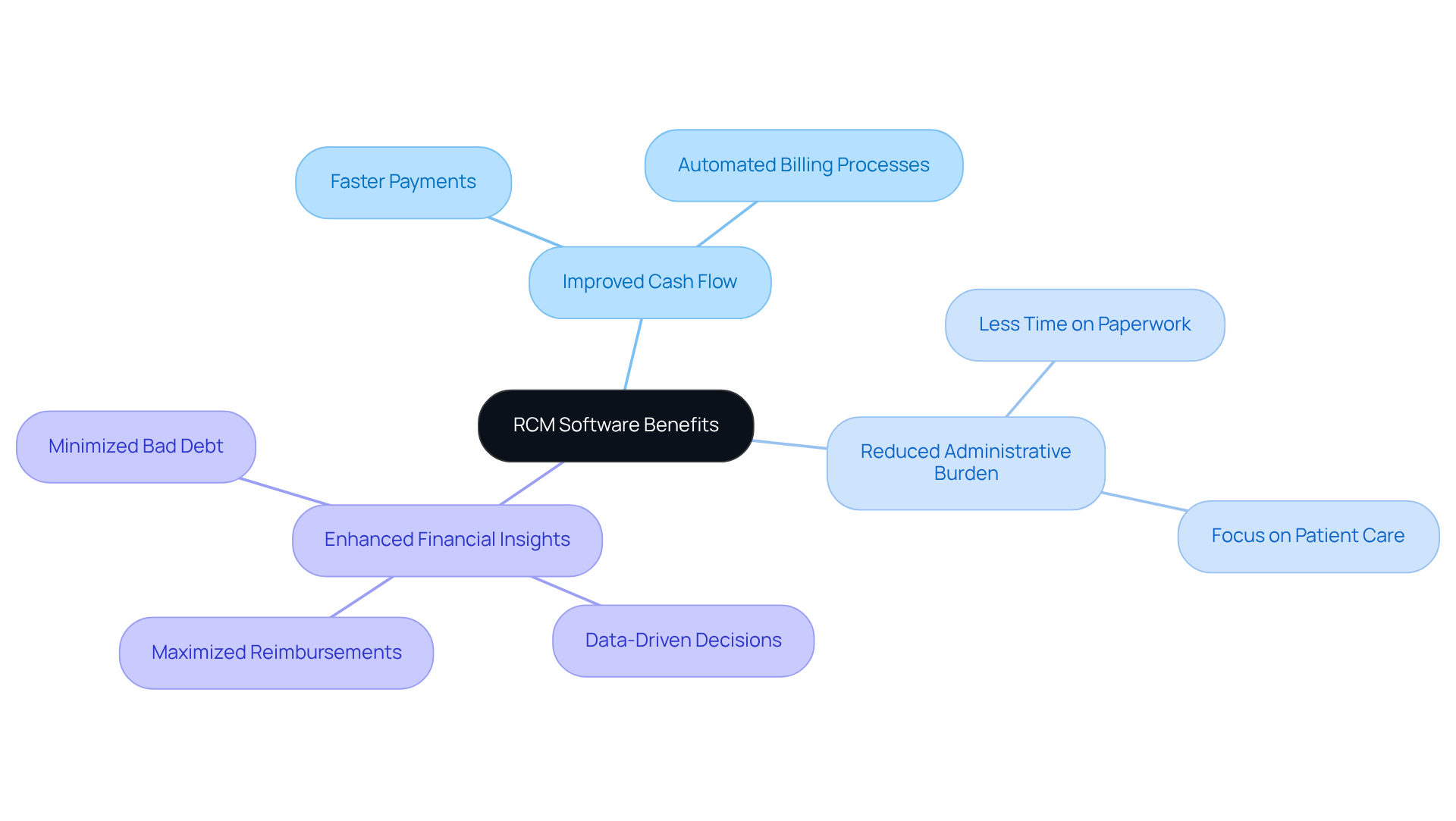
Conclusion
Embracing medical software tools is essential for healthcare providers who want to enhance operational efficiency and improve patient care. Have you ever felt overwhelmed by administrative tasks? These innovative solutions not only alleviate those burdens but also foster a more compassionate and effective healthcare environment. By adopting technologies like AI platforms, EHR systems, telemedicine applications, and practice management software, providers can focus more on delivering high-quality care while navigating the complexities of modern medical practice.
Throughout this exploration of essential medical software tools, key insights have emerged. From the transformative capabilities of CosmaNeura in streamlining administrative tasks to the advantages of EHR systems in managing patient data, each tool plays a pivotal role in reshaping healthcare delivery. Telemedicine has expanded access to care, while Clinical Decision Support Systems enhance diagnostic accuracy, thereby reducing errors. Moreover, practice management and revenue cycle management software optimize operations and financial performance, ensuring that providers can thrive in a competitive landscape.
The significance of these advancements cannot be overstated. As the healthcare landscape evolves, embracing these medical software tools will not only help providers manage their workloads effectively but also enhance the overall patient experience. It’s crucial for healthcare professionals to stay informed about the latest technologies and consider how they can integrate these tools into their practices. By doing so, they can contribute to a future where healthcare is more efficient, accessible, and patient-centered, ultimately ensuring the well-being of both providers and patients alike.
Key Solutions to Consider:
- AI Platforms: Streamline administrative tasks.
- EHR Systems: Manage patient data effectively.
- Telemedicine: Expand access to care.
- Clinical Decision Support Systems: Enhance diagnostic accuracy.
- Practice Management Software: Optimize operations and financial performance.
Are you ready to take the next step? By embracing these tools, you can make a meaningful impact in your practice and improve the lives of your patients.




